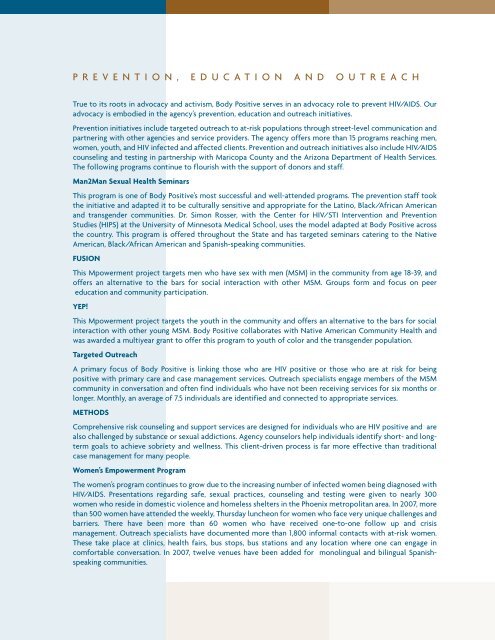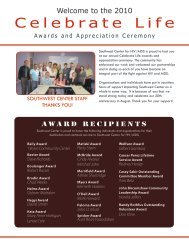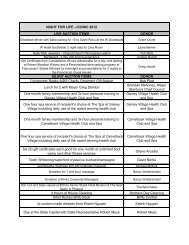A N N U A L R E P O R T 2 0 0 7 - Southwest Center for HIV/AIDS
A N N U A L R E P O R T 2 0 0 7 - Southwest Center for HIV/AIDS
A N N U A L R E P O R T 2 0 0 7 - Southwest Center for HIV/AIDS
You also want an ePaper? Increase the reach of your titles
YUMPU automatically turns print PDFs into web optimized ePapers that Google loves.
pannualreport050208.qxp:Layout 1 5/5/08 11:23 AM Page 9<br />
P R E V E N T I O N , E D U C A T I O N A N D O U T R E A C H<br />
True to its roots in advocacy and activism, Body Positive serves in an advocacy role to prevent <strong>HIV</strong>/<strong>AIDS</strong>. Our<br />
advocacy is embodied in the agency’s prevention, education and outreach initiatives.<br />
Prevention initiatives include targeted outreach to at-risk populations through street-level communication and<br />
partnering with other agencies and service providers. The agency offers more than 15 programs reaching men,<br />
women, youth, and <strong>HIV</strong> infected and affected clients. Prevention and outreach initiatives also include <strong>HIV</strong>/<strong>AIDS</strong><br />
counseling and testing in partnership with Maricopa County and the Arizona Department of Health Services.<br />
The following programs continue to flourish with the support of donors and staff.<br />
Man2Man Sexual Health Seminars<br />
This program is one of Body Positive’s most successful and well-attended programs. The prevention staff took<br />
the initiative and adapted it to be culturally sensitive and appropriate <strong>for</strong> the Latino, Black/African American<br />
and transgender communities. Dr. Simon Rosser, with the <strong>Center</strong> <strong>for</strong> <strong>HIV</strong>/STI Intervention and Prevention<br />
Studies (HIPS) at the University of Minnesota Medical School, uses the model adapted at Body Positive across<br />
the country. This program is offered throughout the State and has targeted seminars catering to the Native<br />
American, Black/African American and Spanish-speaking communities.<br />
FUSION<br />
This Mpowerment project targets men who have sex with men (MSM) in the community from age 18-39, and<br />
offers an alternative to the bars <strong>for</strong> social interaction with other MSM. Groups <strong>for</strong>m and focus on peer<br />
education and community participation.<br />
YEP!<br />
This Mpowerment project targets the youth in the community and offers an alternative to the bars <strong>for</strong> social<br />
interaction with other young MSM. Body Positive collaborates with Native American Community Health and<br />
was awarded a multiyear grant to offer this program to youth of color and the transgender population.<br />
Targeted Outreach<br />
A primary focus of Body Positive is linking those who are <strong>HIV</strong> positive or those who are at risk <strong>for</strong> being<br />
positive with primary care and case management services. Outreach specialists engage members of the MSM<br />
community in conversation and often find individuals who have not been receiving services <strong>for</strong> six months or<br />
longer. Monthly, an average of 7.5 individuals are identified and connected to appropriate services.<br />
METHODS<br />
Comprehensive risk counseling and support services are designed <strong>for</strong> individuals who are <strong>HIV</strong> positive and are<br />
also challenged by substance or sexual addictions. Agency counselors help individuals identify short- and longterm<br />
goals to achieve sobriety and wellness. This client-driven process is far more effective than traditional<br />
case management <strong>for</strong> many people.<br />
Women’s Empowerment Program<br />
The women’s program continues to grow due to the increasing number of infected women being diagnosed with<br />
<strong>HIV</strong>/<strong>AIDS</strong>. Presentations regarding safe, sexual practices, counseling and testing were given to nearly 300<br />
women who reside in domestic violence and homeless shelters in the Phoenix metropolitan area. In 2007, more<br />
than 500 women have attended the weekly, Thursday luncheon <strong>for</strong> women who face very unique challenges and<br />
barriers. There have been more than 60 women who have received one-to-one follow up and crisis<br />
management. Outreach specialists have documented more than 1,800 in<strong>for</strong>mal contacts with at-risk women.<br />
These take place at clinics, health fairs, bus stops, bus stations and any location where one can engage in<br />
com<strong>for</strong>table conversation. In 2007, twelve venues have been added <strong>for</strong> monolingual and bilingual Spanishspeaking<br />
communities.




